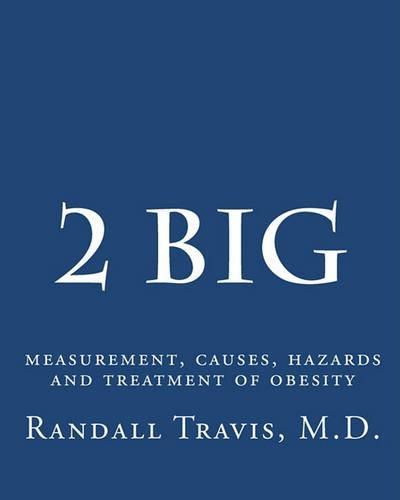Readings Newsletter
Become a Readings Member to make your shopping experience even easier.
Sign in or sign up for free!
You’re not far away from qualifying for FREE standard shipping within Australia
You’ve qualified for FREE standard shipping within Australia
The cart is loading…






This book was written for the general reader, a health care provider, a counselor, a person struggling with their own or anothers obesity, in short, someone who wants a deeper understanding than is likely to be provided by newspapers and magazines. It was not written for scholars and scientists who have their own sources of information. Certain words and ideas which may not be familiar to everyone are explained in an appendix. Another appendix is provided for persons who are interested in the mathematical basis of some measurements. The text is a critique of the scientific evidence concerning the origins, consequences, prevention and treatment of obesity. The evidence is found in a difficult literature which must be approached with skepticism but recognizing that there are established if sometimes painful truths. Among the painful truths is the fact that much of what is published, especially in the popular media, but also in professional publications, is false, arguably fraudulent, disingenuous, or mistaken. There can be no doubt that the subject is, from a scientific perspective, difficult. The physiological systems which regulate body composition and size are complex, incompletely understood and not easily studied in humans. In laboratory animals it is possible to control many important variables, genetics, gender, age, dietary intakes, physical activities, type of data obtained, and duration of observation. In humans there are serious limitations on the quality of control of these variables. It should not be forgotten that laboratory mice do not voluntarily smoke tobacco or drink alcoholic beverages. However, the importance of this subject cannot be overestimated. The prevalence and rise in obesity is appalling. The cost in human misery and economic resources is heart breaking. Only by developing an evidence-based, validated, confirmed and penetrating scientific understanding of obesity can present trends be reversed.
$9.00 standard shipping within Australia
FREE standard shipping within Australia for orders over $100.00
Express & International shipping calculated at checkout
This book was written for the general reader, a health care provider, a counselor, a person struggling with their own or anothers obesity, in short, someone who wants a deeper understanding than is likely to be provided by newspapers and magazines. It was not written for scholars and scientists who have their own sources of information. Certain words and ideas which may not be familiar to everyone are explained in an appendix. Another appendix is provided for persons who are interested in the mathematical basis of some measurements. The text is a critique of the scientific evidence concerning the origins, consequences, prevention and treatment of obesity. The evidence is found in a difficult literature which must be approached with skepticism but recognizing that there are established if sometimes painful truths. Among the painful truths is the fact that much of what is published, especially in the popular media, but also in professional publications, is false, arguably fraudulent, disingenuous, or mistaken. There can be no doubt that the subject is, from a scientific perspective, difficult. The physiological systems which regulate body composition and size are complex, incompletely understood and not easily studied in humans. In laboratory animals it is possible to control many important variables, genetics, gender, age, dietary intakes, physical activities, type of data obtained, and duration of observation. In humans there are serious limitations on the quality of control of these variables. It should not be forgotten that laboratory mice do not voluntarily smoke tobacco or drink alcoholic beverages. However, the importance of this subject cannot be overestimated. The prevalence and rise in obesity is appalling. The cost in human misery and economic resources is heart breaking. Only by developing an evidence-based, validated, confirmed and penetrating scientific understanding of obesity can present trends be reversed.